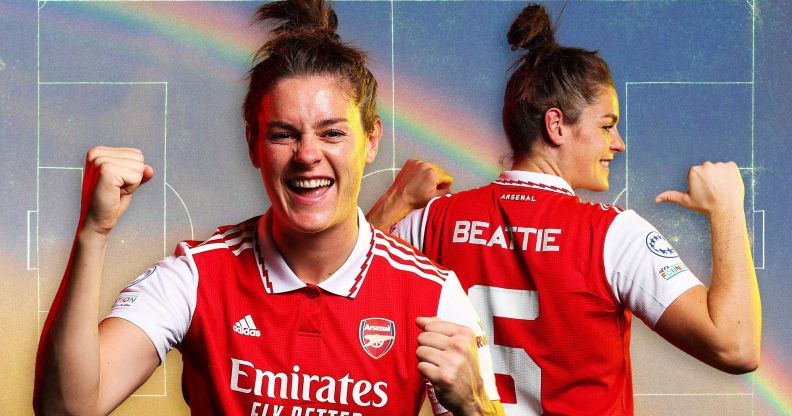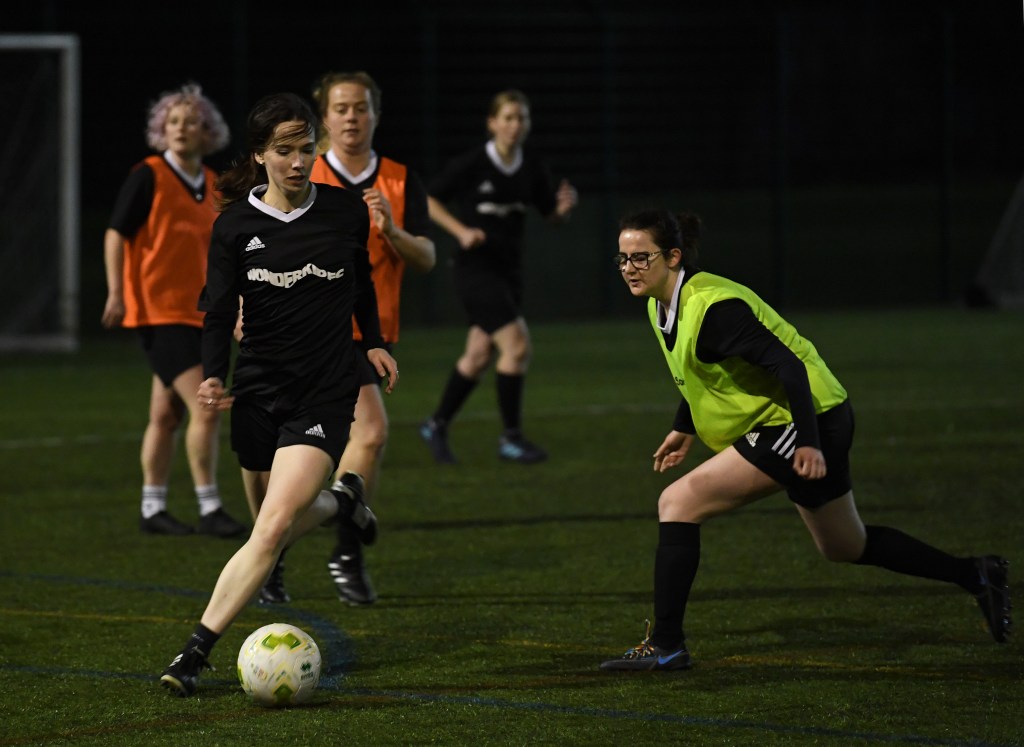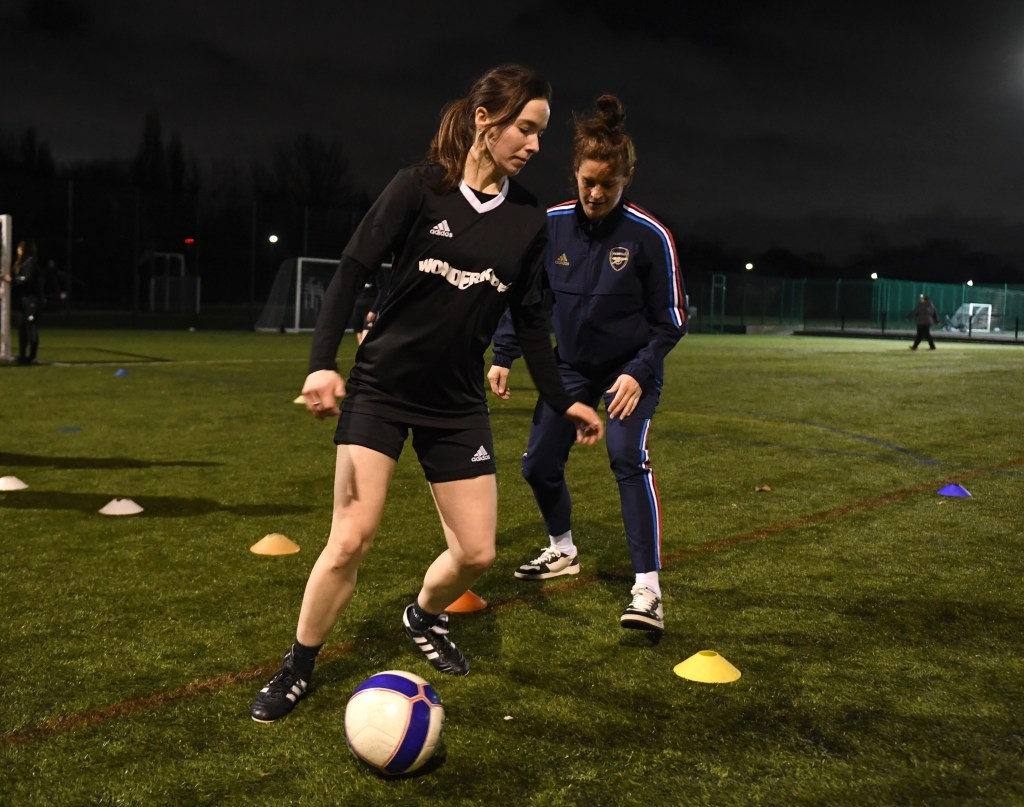Queer Arsenal star Jen Beattie explains why it’s still so important for footballers to come out

Arsenal football star Jen Beattie. (Getty/PinkNews)
Arsenal football star Jen Beattie. (Getty/PinkNews)
Arsenal star Jen Beattie has explained why she thinks there’s less of a need to come out in women’s football as there is in the men’s game – although she admits there’s still work to do in both camps.
Speaking to PinkNews about queerness in football and reflecting on her own coming out journey, the former Scottish international says: “The women’s game has always been very inclusive and it’s something the men’s game can learn from. I came out when I was pretty young and in women’s football it was always an open discussion.
“No matter your age, you always felt pretty comfortable speaking about it, whatever you identified as.”
Beattie, who has also played for Manchester City and Celtic Ladies, as well as in France, was also quick to point out the importance of teams engaging with initiatives like LGBT+ History Month – especially while the sport is still developing in terms of its inclusivity.
“I’d love for us to reach a point where no one has to come out and it doesn’t need to be a massive thing,” the defender explains. “The women’s game already has an inclusive community where maybe we don’t have to [come out]. No matter what profile you have, it’s quite a natural thing to be able to share your sexuality.
“But we still need to challenge perception. It’s even more important to do so in the men’s game because that’s where the game needs to grow. I still think both games need role models and we need people to be as open as they can. That’s what helps the next generation.”

PinkNews spoke to Beattie in the days following Czech international Jakub Jankto’s coming out, as he revealed that his fellow LGBTQ+ players are afraid to do so. She is helping Arsenal move ahead of the pack in this regard, and there’s a big smile on her face when she talks about what a welcoming place it is to play football.
“It’s a very one-club mentality no matter what background you’re from,” she explains. And this year’s LGBT+ History Month, especially. You can highlight the men’s game against Brentford where there were a lot of flags, lights and visuals to make the timing of that game apparent.
“Look over the whole month and Arsenal is at the forefront of having visibility across the game and making people aware of what we stand for, and value, as a club. It’s good to highlight this month but it’s important to do it across the year too. Arsenal does an exceptional job of that.”
There’s also a strong interaction with Gay Gooners, the queer supporters’ group which recently celebrated its 10th anniversary. Jen joined them for 2022’s London Pride parade.
Arsenal has also forged a connection with Wonderkid FC, a Hackney-based LGBTQ- inclusive team that’s helping build diversity at the grassroots level.

Jen Beattie, the daughter of former British Lions rugby star John Beattie, admits that she was lucky enough not to have to face any hurdles in her journey through the game. “I guess I come from a lucky position,” she says.
“I played in boys’ teams growing up, then in women’s teams, and I had a very good experience with open-minded people around me who understood my situation. I’m fully aware that’s a rare thing and that a lot of abuse still goes on nowadays. [That’s] why it’s important to highlight this month not only [for] how far we’ve come along, but [for] how much work we still have to do.”
She has, however, appeared in recent gossip columns as news of her relationship reached the tabloid press. “That comes part-and-parcel of being a role model in the sport and having a profile,” she says.
“With my social life, I can’t choose what people are going to write. But I enjoy and take my role very seriously of being openly gay and outspoken about it because when I was a kid, I didn’t have someone [to look up to who] was open about their sexuality. I think that would have helped me. If I’ve helped someone else, that’s the most important thing.”
She’s also very passionate about the legacy of Euro 2022 and the inherent goodwill of the women’s game reaching a larger stage, something set to continue in July at the World Cup in Australia and New Zealand.
England captain Leah Williamson has already spoken of her hope that the Lionesses will wear the OneLove armband that proved such a talking point – and ultimately damp squib – at the men’s World Cup in Qatar last year.
“She’s a role model by putting high importance on something like that,” says Beattie. “They are such a ‘together’ team and that’s what it’s all about – community, inclusiveness – and the more that the women’s game can do that, the better.”
Naturally, she was as delighted as the rest of us when pundit and presenter Alex Scott wore the armband during the BBC’s coverage of the England men’s first game in Qatar.
“I saw her wearing it pitch-side and thought it was absolutely brilliant. I didn’t get the opportunity to captain Scotland often, but I personally picked the rainbow band when I did. The more visibility in the game, the better.”

